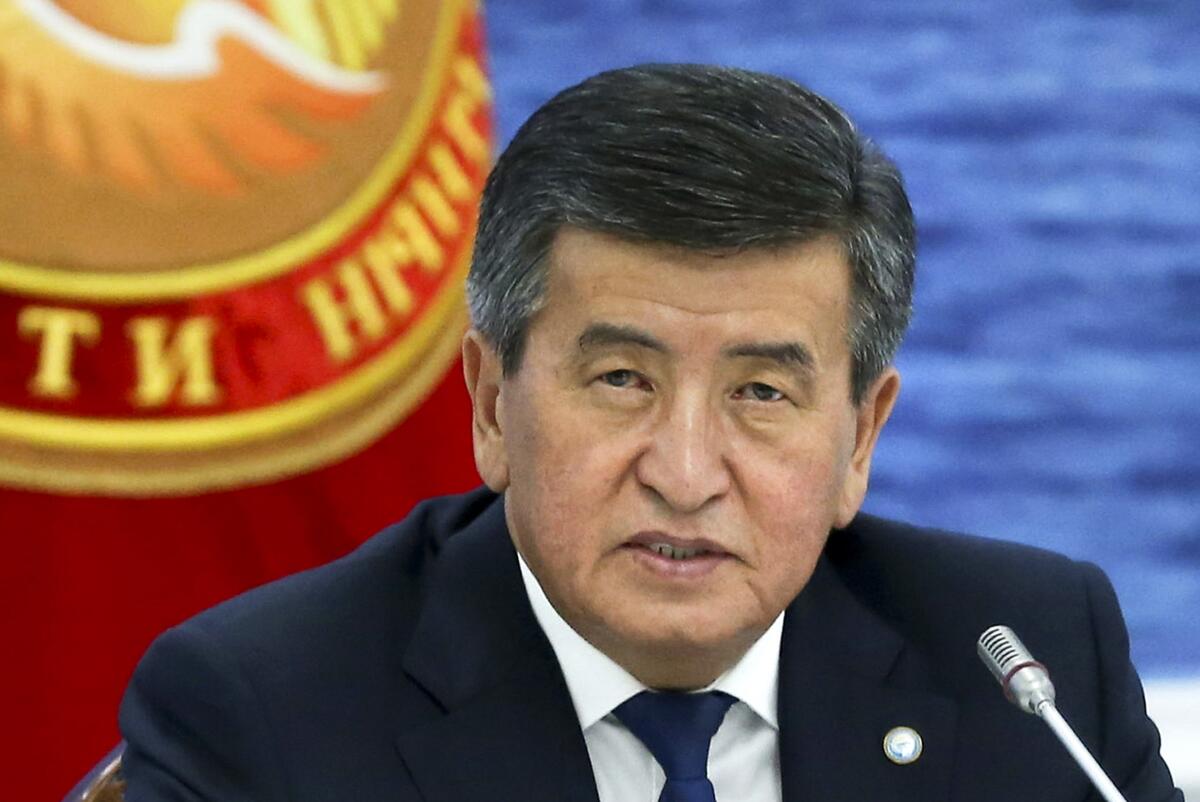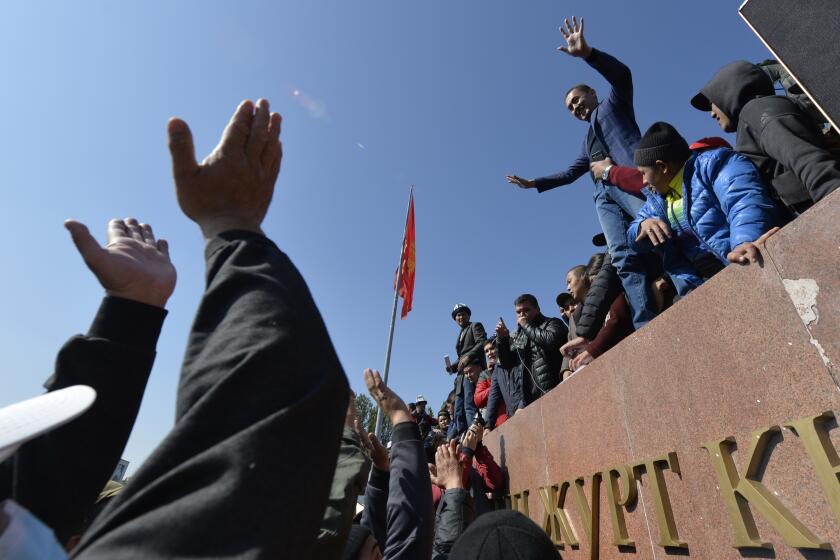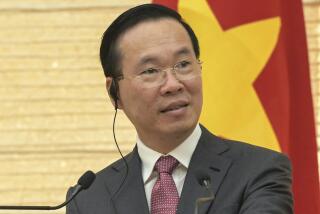President of Kyrgyzstan steps down after days of protest

- Share via
MOSCOW — Kyrgyzstan President Sooronbai Jeenbekov announced his resignation Thursday in a bid to end the turmoil that has engulfed the Central Asian nation after a disputed parliamentary election.
In a statement released by his office, Jeenbekov, who has faced calls to step down from protesters and political opponents, said that holding onto power wasn’t “worth the integrity of our country and agreement in society.”
“For me, peace in Kyrgyzstan, the country’s integrity, the unity of our people and calm in the society are above all else,” Jeenbekov said.
Protesters in the capital of Bishkek celebrated the announcement, but it’s unclear whether Jeenbekov’s decision will quell the unrest that has gripped the country since last week. The demonstrators quickly moved on to demanding that the parliament be dissolved and that the body’s speaker, who is next in line in the order of succession, also resign.
The parliament must officially approve Jeenbekov’s resignation, and Speaker Kanat Isayev, who was appointed earlier this week, told local media that lawmakers would gather Friday to consider it. Raising the possibility of further confusion and turmoil, Isayev told the Kyrgyz news outlet 24.kg that he doesn’t feel he has the right to take over the presidency since the current parliamentary term is about to end.
Kyrgyzstan, a country of 6.5 million people located on the border with China, was plunged into chaos following an Oct. 4 vote that election officials say was swept by pro-government parties. The opposition said the parliamentary election was tainted by vote-buying and other irregularities.
Protesters then took over government buildings, ransacking some offices, and the Central Election Commission nullified the election. The opposition then announced plans to oust Jeenbekov and form a new government.
Jeenbekov’s announcement Thursday came just a day after he dismissed a demand to step down, saying he would stay on the job until the country’s political situation stabilized.
The president of Kyrgyzstan has declared a state of emergency in the capital to try to end the political turmoil over a disputed election.
Jeenbekov had kept a low profile in the first few days after the election, taking advantage of infighting among protest leaders to dig in. He introduced a state of emergency in Bishkek, which was endorsed Tuesday by parliament.
Authorities deployed troops to Bishkek over the weekend and introduced a curfew. The move eased tensions in the city, where residents feared the looting that accompanied previous uprisings and began forming vigilante groups to protect property. Stores and banks that were closed last week have reopened.
In an effort to stem the unrest, Jeenbekov on Wednesday endorsed the appointment of Sadyr Zhaparov, a former lawmaker who was freed from jail by demonstrators last week, as the country’s new prime minister.
Zhaparov formed a new Cabinet, promised his supporters to push for Jeenbekov’s resignation and held talks with the president hours after Jeenbekov signed off on his appointment. After the talks, Jeenbekov said he would stay in the job until the political situation in Kyrgyzstan stabilized.
Breaking News
Get breaking news, investigations, analysis and more signature journalism from the Los Angeles Times in your inbox.
You may occasionally receive promotional content from the Los Angeles Times.
But hundreds of Zhaparov’s supporters rallied in the capital Wednesday, demanding the president’s resignation and threatening to storm his residence. Zhaparov pledged to meet with the president again on Thursday to persuade him to step down.
It wasn’t immediately clear whether the meeting took place, but protests demanding Jeenbekov’s resignation continued Thursday morning.
Jeenbekov said in his statement that the situation in Bishkek “remains tense” despite the fact that the new Cabinet was appointed the day before, and that he doesn’t want to escalate these tensions.
“On one side, there are the protesters; on the other, law enforcement. Military personnel and law-enforcement services are obligated to use weapons to protect the State Residence. In [that] case, blood will be shed; it is inevitable,” Jeenbekov’s statement said. “I don’t want to go down in history as a president who shot at his own citizens and shed blood.”
The turmoil marks the third time in 15 years that demonstrators have moved to oust a government in Kyrgyzstan, one of the poorest nations to emerge from the former Soviet Union.
As in the uprisings that ousted presidents in 2005 and 2010, the current protests have been driven by clan rivalries that shape the country’s politics.
More to Read
Sign up for Essential California
The most important California stories and recommendations in your inbox every morning.
You may occasionally receive promotional content from the Los Angeles Times.














